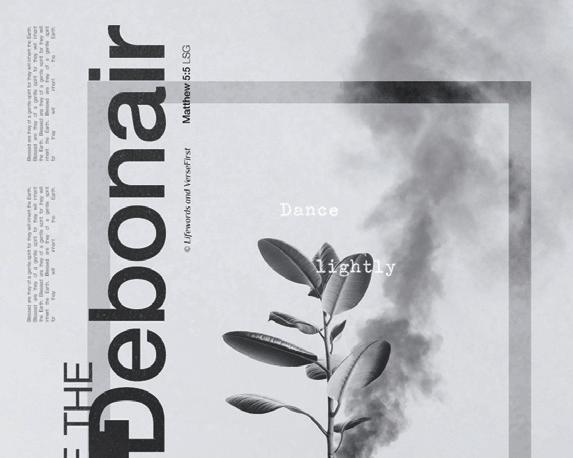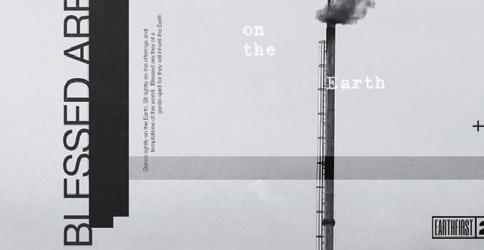
3 minute read
EarthFirst
by Lifewords
Words Jess Bee
Last year – via social media and shaped by Jesus’ Sermon on the Mount – VerseFirst’s EarthFirst campaign looked at what the Bible says about the climate emergency and our stewardship of the planet.
1 “His God Story,” in
The Eloquence of
Grace: Joseph Sittler and the Preaching Life “Blessed are the debonair, for they will inherit the earth” (Matthew 5:5). In a French translation of verses known as the beatitudes, the phrase the English-speaking world know as, “blessed are the meek”, is translated as, “blessed are the debonair”. The dictionary defi nes “debonair” as confi dent, stylish, and charming, but when the Bible was translated into French in the mid-1500s, to be “debonair” meant something quite diff erent:
A person who is not an idolater, one who hasn’t gotten hooked up in anything worldly, one who is so sophisticated as to know wealth for what it is, and that it isn’t everything … This is a person who has a kind of centeredness that doesn’t let the idols of this world capture it. It’s a kind of debonair in which you sit lightly on the off erings and temptations of this world because you have a vision of something better.1
This reframing of “debonair” and its insight into the statement from the beatitudes was a starting point for EarthFirst – a challenge to consider our place in God’s created world and the responsibility we have to look after it; a challenge to throw off the temptations of consumption and greed, and instead, love outrageously.

SEEKING OUT TRUTH
Between 19 October and 27 November 2020, EarthFirst posted images on Facebook and Instagram, alongside blog posts, that highlighted what the Bible has to say about our planet, our inherent privileges, and how our choices can make a diff erence to the world around us. The introductory post read: “There’s no getting away from it. The world is simply not as it should be. From racial injustice and plastic in the food chain, to poverty and oppression in return for cheap clothes, we have gone drastically wrong somewhere. The good news is that’s not the end of the story. The Bible has a lot to say about how living our best life is actually in the best interests of the planet and of the whole of humankind.” Another post talked about environmental justice and “the fair treatment and meaningful involvement of all people regardless of race, colour, national origin, or income.”
MOBILISING YOUNG PEOPLE
VerseFirst was created with the aim to reach young people and encourage them to start their day with a Bible verse. The EarthFirst campaign built on this, tapping into an issue that is close to their hearts. “Activism against climate breakdown is being strongly led by young people,” says Elizabeth King, from the Lifewords UK team. “This campaign from VerseFirst is a great platform to encourage them to be introduced to Scripture that relates to this touchstone issue of our times.” Over the course of the campaign Earthfi rst reached just over 60k people online. They were challenged to put the Bible’s words into practice and to think diff erently about what we consume, and how we respond to our planet and the people we share it with. Not just tipping our hat at the idea of consuming less, and loving more, but choosing to do it. Choosing to be debonair, and dancing lightly where we have been conditioned to stomp. Find out more about EarthFirst at www.versefi rst.com

PRAY
Give thanks for the way EarthFirst helped us engage with the climate crisis.
Praise God for the way the campaign reached young people with God’s Word.
Pray that we would consider the part we can play to look after our planet.






